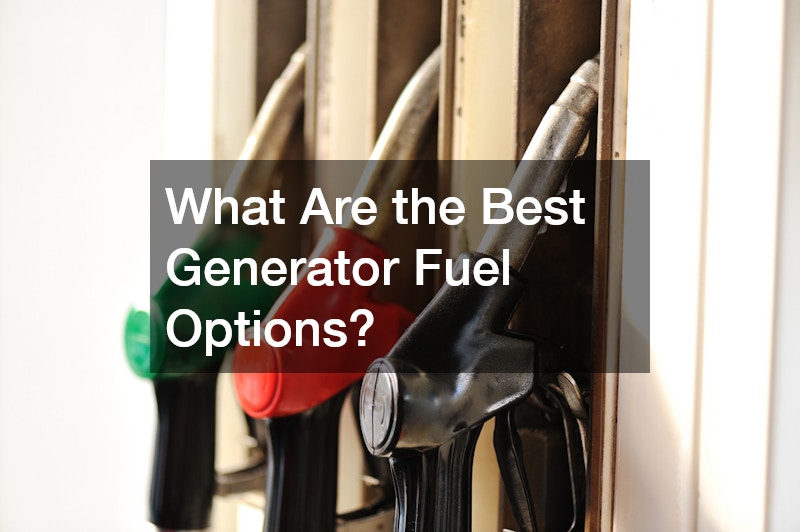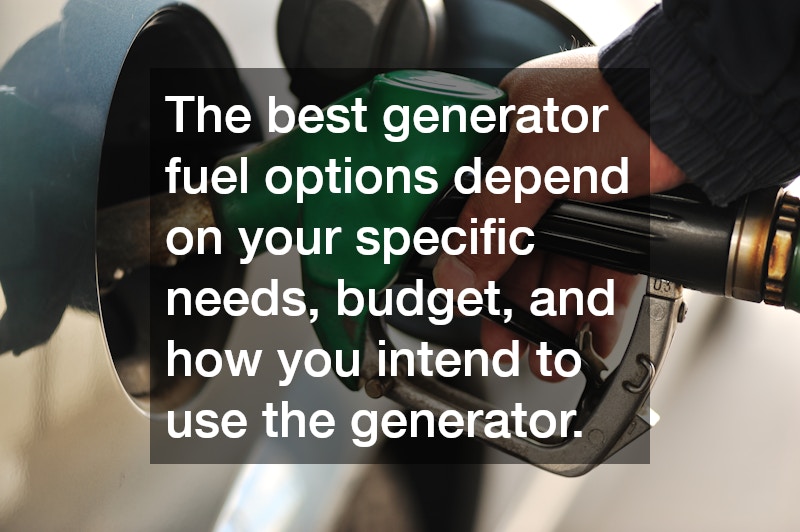What Are the Best Generator Fuel Options?


Choosing the right fuel for your generator is crucial to ensure efficiency, safety, and reliability during an emergency or power outage. Each fuel type has its own pros and cons, depending on the specific use case, environmental concerns, and fuel availability. Here are some of the best generator fuel options to consider for your generator:
1. Gasoline
Gasoline is one of the most common fuel options for portable generators due to its availability. Most gas stations offer gasoline, making it an accessible choice for many people.
Additionally, gasoline generators are typically more affordable compared to other fuel types.
Advantages:
- Availability: Readily available in most places, making it convenient for quick refueling.
- Affordability: Gasoline-powered generators are generally less expensive upfront.
Disadvantages:
- Short Shelf Life: Gasoline has a relatively short shelf life, especially without stabilizers, which makes long-term storage challenging.
- Safety: It’s highly flammable and needs to be stored carefully.
- Efficiency: Gasoline generators can be less fuel-efficient, leading to higher operating costs over time.
2. Diesel
Diesel is another popular option, especially for larger, more industrial-sized generators. Diesel generators tend to be more fuel-efficient than gasoline ones, making them suitable for long-term use.
Advantages:
- Fuel Efficiency: Diesel engines are known for being highly efficient, which can reduce fuel costs over extended usage periods.
- Longer Lifespan: Diesel generators typically have a longer operational life and are more durable.
- Availability: Diesel fuel is widely available, especially in rural areas or for commercial use.
Disadvantages:
- Cost: Diesel generators can be more expensive upfront.
- Noise: Diesel engines tend to be louder than other types, which might be a concern in residential areas.
- Emissions: Diesel generators produce higher emissions compared to some cleaner alternatives.
3. Propane (LPG)
Propane is considered a cleaner-burning fuel and is often stored in liquid form. Propane generators are versatile, suitable for both residential and commercial use.
Advantages:
- Long Shelf Life: Propane doesn’t degrade over time, making it an excellent option for long-term storage.
- Cleaner Burning: Propane produces fewer emissions, which is better for the environment.
- Versatility: Propane can be used for other purposes, such as heating or cooking, making it a multi-use option.
Disadvantages:
- Storage: Propane requires a tank, which can take up more space than other fuel storage options.
- Availability: Propane isn’t as widely available at gas stations compared to gasoline or diesel.
- Efficiency: Propane-powered generators tend to be less fuel-efficient than diesel generators.
4. Natural Gas
Natural gas is a convenient option for generators that are permanently installed, as it’s typically connected directly to your home’s gas line. This makes it ideal for standby generators that provide backup power automatically during an outage.
Advantages:
- Continuous Supply: Natural gas lines offer an uninterrupted fuel supply, eliminating the need for storage.
- Environmentally Friendly: It burns cleaner than gasoline and diesel, producing fewer emissions.
- Convenience: No need to refuel, as the generator is connected directly to a gas line.
Disadvantages:
- Not Portable: Natural gas generators are typically stationary, making them unsuitable for portable generator needs.
- Availability: Not all homes or facilities have access to natural gas lines.
- Vulnerability: If there’s an issue with the gas supply, your generator may become inoperable.
The best generator fuel options depend on your specific needs, budget, and how you intend to use the generator. Gasoline is a good choice for short-term or portable use, while diesel is more efficient for long-term, heavy-duty needs. Propane offers a clean-burning alternative with a long shelf life, and natural gas is a convenient option for permanent standby generators. Each fuel type has its strengths, so carefully assess your requirements to determine the best option for your generator.
.
